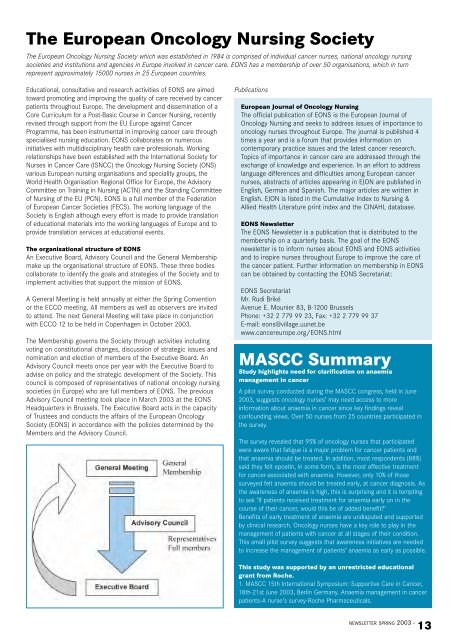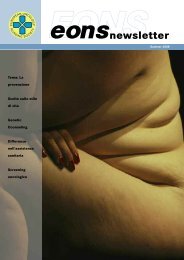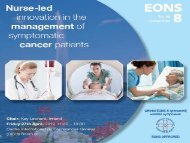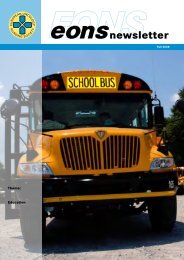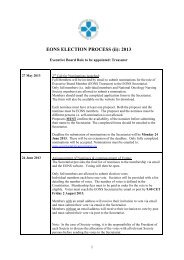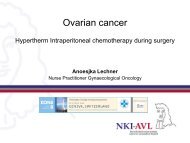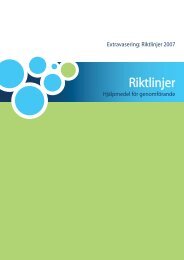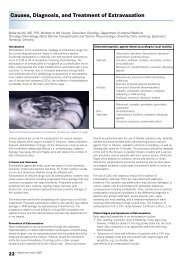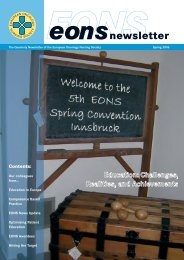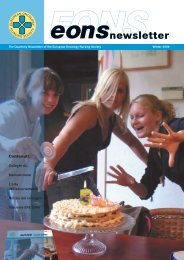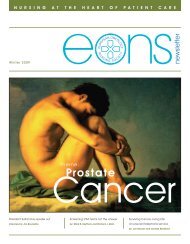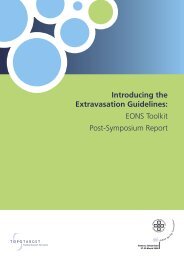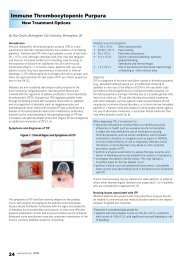ECCO XII Copenhagen - the European Oncology Nursing Society
ECCO XII Copenhagen - the European Oncology Nursing Society
ECCO XII Copenhagen - the European Oncology Nursing Society
Create successful ePaper yourself
Turn your PDF publications into a flip-book with our unique Google optimized e-Paper software.
The <strong>European</strong> <strong>Oncology</strong> <strong>Nursing</strong> <strong>Society</strong>The <strong>European</strong> <strong>Oncology</strong> <strong>Nursing</strong> <strong>Society</strong> which was established in 1984 is comprised of individual cancer nurses, national oncology nursingsocieties and institutions and agencies in Europe involved in cancer care. EONS has a membership of over 50 organisations, which in turnrepresent approximately 15000 nurses in 25 <strong>European</strong> countries.Educational, consultative and research activities of EONS are aimedtoward promoting and improving <strong>the</strong> quality of care received by cancerpatients throughout Europe. The development and dissemination of aCore Curriculum for a Post-Basic Course in Cancer <strong>Nursing</strong>, recentlyrevised through support from <strong>the</strong> EU Europe against CancerProgramme, has been instrumental in improving cancer care throughspecialised nursing education. EONS collaborates on numerousinitiatives with multidisciplinary health care professionals. Workingrelationships have been established with <strong>the</strong> International <strong>Society</strong> forNurses in Cancer Care (ISNCC) <strong>the</strong> <strong>Oncology</strong> <strong>Nursing</strong> <strong>Society</strong> (ONS)various <strong>European</strong> nursing organisations and speciality groups, <strong>the</strong>World Health Organisation Regional Office for Europe, <strong>the</strong> AdvisoryCommittee on Training in <strong>Nursing</strong> (ACTN) and <strong>the</strong> Standing Committeeof <strong>Nursing</strong> of <strong>the</strong> EU (PCN). EONS is a full member of <strong>the</strong> Federationof <strong>European</strong> Cancer Societies (FECS). The working language of <strong>the</strong><strong>Society</strong> is English although every effort is made to provide translationof educational materials into <strong>the</strong> working languages of Europe and toprovide translation services at educational events.The organisational structure of EONSAn Executive Board, Advisory Council and <strong>the</strong> General Membershipmake up <strong>the</strong> organisational structure of EONS. These three bodiescollaborate to identify <strong>the</strong> goals and strategies of <strong>the</strong> <strong>Society</strong> and toimplement activities that support <strong>the</strong> mission of EONS.A General Meeting is held annually at ei<strong>the</strong>r <strong>the</strong> Spring Conventionor <strong>the</strong> <strong>ECCO</strong> meeting. All members as well as observers are invitedto attend. The next General Meeting will take place in conjunctionwith <strong>ECCO</strong> 12 to be held in <strong>Copenhagen</strong> in October 2003.The Membership governs <strong>the</strong> <strong>Society</strong> through activities includingvoting on constitutional changes, discussion of strategic issues andnomination and election of members of <strong>the</strong> Executive Board. AnAdvisory Council meets once per year with <strong>the</strong> Executive Board toadvise on policy and <strong>the</strong> strategic development of <strong>the</strong> <strong>Society</strong>. Thiscouncil is composed of representatives of national oncology nursingsocieties (in Europe) who are full members of EONS. The previousAdvisory Council meeting took place in March 2003 at <strong>the</strong> EONSHeadquarters in Brussels. The Executive Board acts in <strong>the</strong> capacityof Trustees and conducts <strong>the</strong> affairs of <strong>the</strong> <strong>European</strong> <strong>Oncology</strong><strong>Society</strong> (EONS) in accordance with <strong>the</strong> policies determined by <strong>the</strong>Members and <strong>the</strong> Advisory Council.Publications<strong>European</strong> Journal of <strong>Oncology</strong> <strong>Nursing</strong>The official publication of EONS is <strong>the</strong> <strong>European</strong> Journal of<strong>Oncology</strong> <strong>Nursing</strong> and seeks to address issues of importance tooncology nurses throughout Europe. The journal is published 4times a year and is a forum that provides information oncontemporary practice issues and <strong>the</strong> latest cancer research.Topics of importance in cancer care are addressed through <strong>the</strong>exchange of knowledge and experience. In an effort to addresslanguage differences and difficulties among <strong>European</strong> cancernurses, abstracts of articles appearing in EJON are published inEnglish, German and Spanish. The major articles are written inEnglish. EJON is listed in <strong>the</strong> Cumulative Index to <strong>Nursing</strong> &Allied Health Literature print index and <strong>the</strong> CINAHL database.EONS NewsletterThe EONS Newsletter is a publication that is distributed to <strong>the</strong>membership on a quarterly basis. The goal of <strong>the</strong> EONSnewsletter is to inform nurses about EONS and EONS activitiesand to inspire nurses throughout Europe to improve <strong>the</strong> care of<strong>the</strong> cancer patient. Fur<strong>the</strong>r information on membership in EONScan be obtained by contacting <strong>the</strong> EONS Secretariat:EONS SecretariatMr. Rudi BrikéAvenue E. Mounier 83, B-1200 BrusselsPhone: +32 2 779 99 23, Fax: +32 2 779 99 37E-mail: eons@village.uunet.bewww.cancereurope.org/EONS.htmlMASCC SummaryStudy highlights need for clarification on anaemiamanagement in cancerA pilot survey conducted during <strong>the</strong> MASCC congress, held in June2003, suggests oncology nurses’ may need access to moreinformation about anaemia in cancer since key findings revealconfounding views. Over 50 nurses from 25 countries participated in<strong>the</strong> survey.The survey revealed that 95% of oncology nurses that participatedwere aware that fatigue is a major problem for cancer patients andthat anaemia should be treated. In addition, most respondents (88%)said <strong>the</strong>y felt epoetin, in some form, is <strong>the</strong> most effective treatmentfor cancer-associated with anaemia. However, only 10% of thosesurveyed felt anaemia should be treated early, at cancer diagnosis. As<strong>the</strong> awareness of anaemia is high, this is surprising and it is temptingto ask ‘If patients received treatment for anaemia early on in <strong>the</strong>course of <strong>the</strong>ir cancer, would this be of added benefit?’Benefits of early treatment of anaemia are undisputed and supportedby clinical research. <strong>Oncology</strong> nurses have a key role to play in <strong>the</strong>management of patients with cancer at all stages of <strong>the</strong>ir condition.This small pilot survey suggests that awareness initiatives are neededto increase <strong>the</strong> management of patients’ anaemia as early as possible.This study was supported by an unrestricted educationalgrant from Roche.1. MASCC 15th International Symposium: Supportive Care in Cancer,18th-21st June 2003, Berlin Germany. Anaemia management in cancerpatients-A nurse’s survey-Roche Pharmaceuticals.NEWSLETTER SPRING 2003 -13


